Think about it: when searching for a restaurant in your vicinity, you wouldn’t be too happy if Google displayed results that are located 40-45 kilometers away, right? We all prefer finding something nearby that we can reach within a few minutes, and that’s perfectly reasonable.
That’s where Local SEO comes in handy. It lets customers quickly discover and locate the desired business or location nearby.

We would say it’s a waste of opportunity if your store name isn’t popping up while people search for services that align with your business. For instance, if you run a bakery shop, you will want your store name to come up when someone searches for terms such as “a cake shop near me” or “a bakery store near me.”
Almost all users (97%) use the internet to find local businesses. It’s clear that consumers have come to be increasingly reliant on the Internet to discover and connect with products, services, and companies. Interestingly, most users (54%) search for businesses in their vicinity at least once a month, and a significant portion (12%) perform these searches daily.
No wonder this has compelled small businesses to use local SEO (Search Engine Optimization) to bring in more customers and improve their online visibility. Small businesses can implement the following effective local SEO strategies to achieve higher rankings on search engines and attract a more extensive local customer base.
Google My Business Optimization
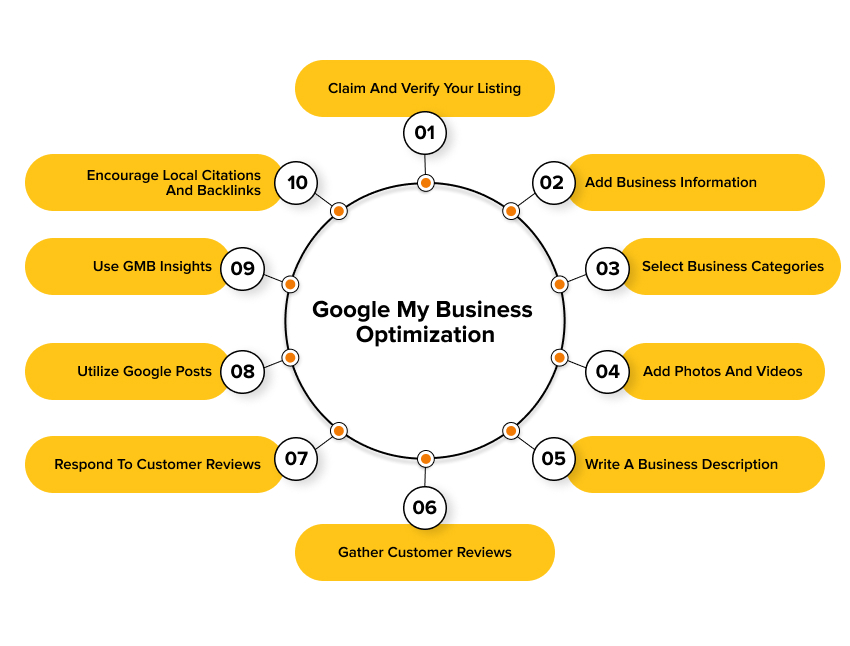
Having a Google My Business (GMB) profile is vital for local SEO in more ways than one. Firstly, it improves how your business ranks and shows up in search results, making it more visible and attracting more potential customers. Secondly, it facilitates better customer support and engagement since you can respond quickly to inquiries and address feedback.
Thirdly, it can increase sales and website traffic because local searches often result in actual purchases. Besides, having an exceptional GMB profile with positive reviews assists you with contacting a more extensive audience and laying out your image as a confided-in expert in your industry. Eventually, having a GMB profile upgrades your possibilities of showing up in the top neighborhood query items, which implies more clients and more business for you.
Making sure your Google Business Profile (GBP) is optimized is crucial for getting noticed by local customers in your area. Use this detailed guide to make sure your GBP listing is fully optimized. Then, utilizing legitimate methods, you can work on your possibilities and draw in intrigued clients close to your business.
Here are some strategies for optimizing your Google My Business (GMB) profile:
Claim and Verify Your Listing
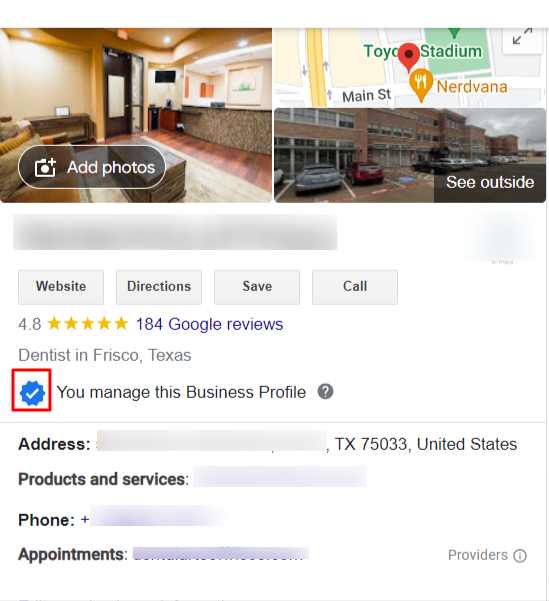
First, take ownership of your GMB (Google My Business) listing and complete the verification process. This step guarantees that you have complete control over your business details.
Provide Accurate Business Information
Fill out all the relevant details such as business name, address, phone number, website, and hours of operation. Make sure that this data is exact and predictable across all stages.
Select the Right Business Categories
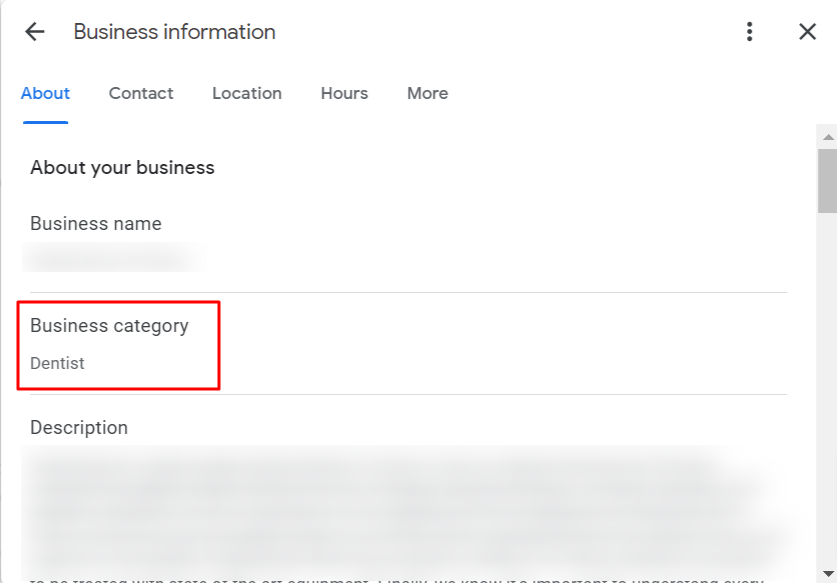
The most relevant categories accurately describe your business. Finding the right category can help Google understand and display your business for relevant searches.
Write a Compelling Business Description
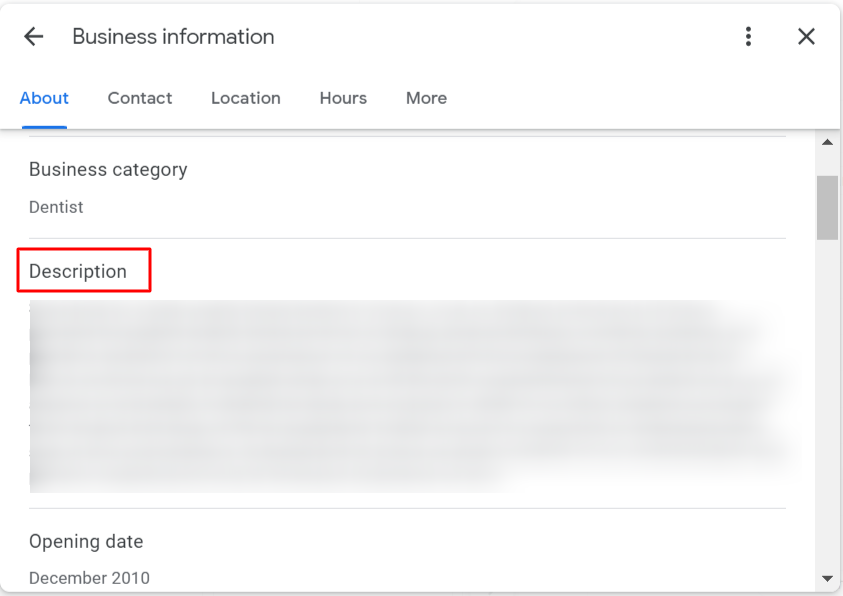
Craft a concise, engaging description highlighting your unique selling points and key offerings. Use relevant keywords naturally to improve visibility in search results.
Add High-Quality Photos and Videos
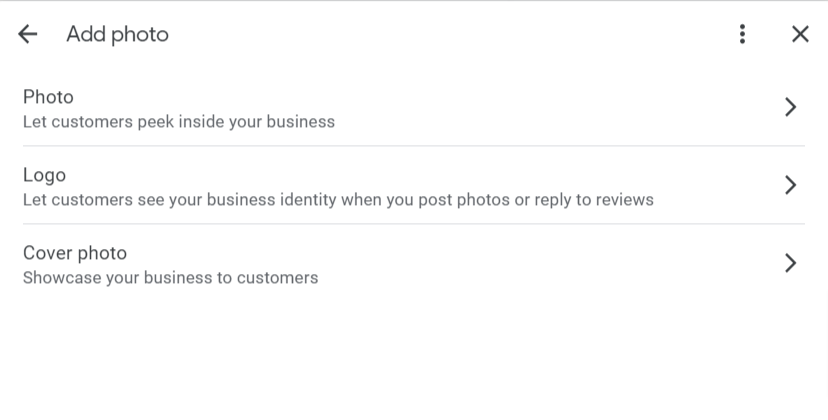
Upload high-resolution images showcasing your products, services, and location. Visual content can significantly enhance your listing and attract more attention from potential customers.
Gather and Respond to Customer Reviews
Encourage customers to leave reviews on your GMB profile. Answer instantly to positive and negative reviews to show your commitment and obligation to consumer loyalty.
Utilize Google Posts
Use Google Posts to share updates, promotions, events, and other relevant content. It is a highly effective way to increase engagement and drive traffic to your website.
Monitor and Update Business Information
Regularly monitor your GMB profile for changes or updates. Keep your business information accurate and up to date to provide a seamless experience for potential customers.
Use GMB Insights
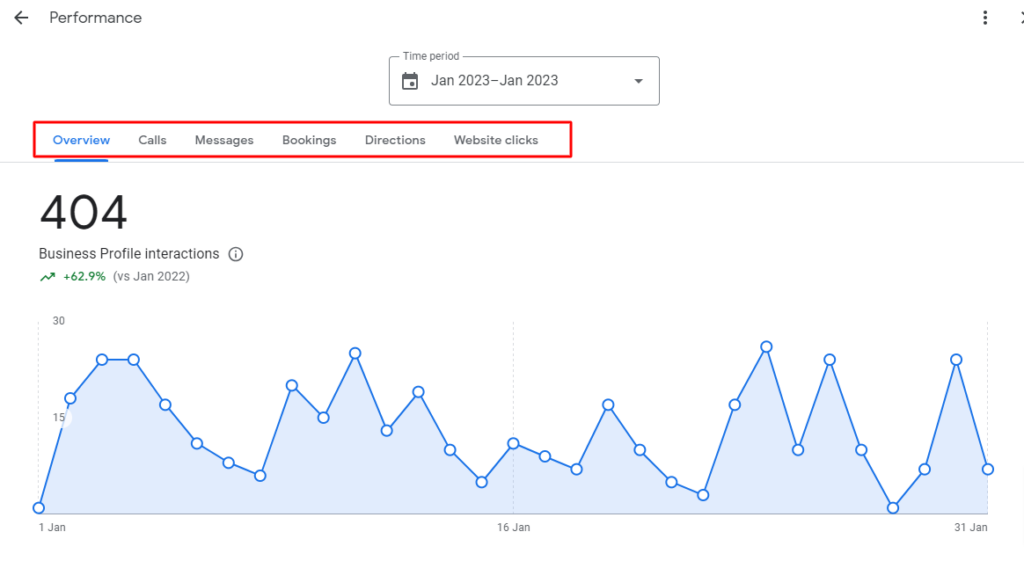
Leverage the insights provided by GMB to understand how customers are finding and interacting with your business. This data can guide your optimization efforts and help you make informed decisions.
Encourage Local Citations and Backlinks
Seek opportunities to build local citations and acquire relevant backlinks from reputable local websites. This strategy can boost your local SEO efforts and improve your GMB profile’s visibility.
Read:- How to Conduct a Comprehensive SEO Audit for Your Website
Local Keyword Research
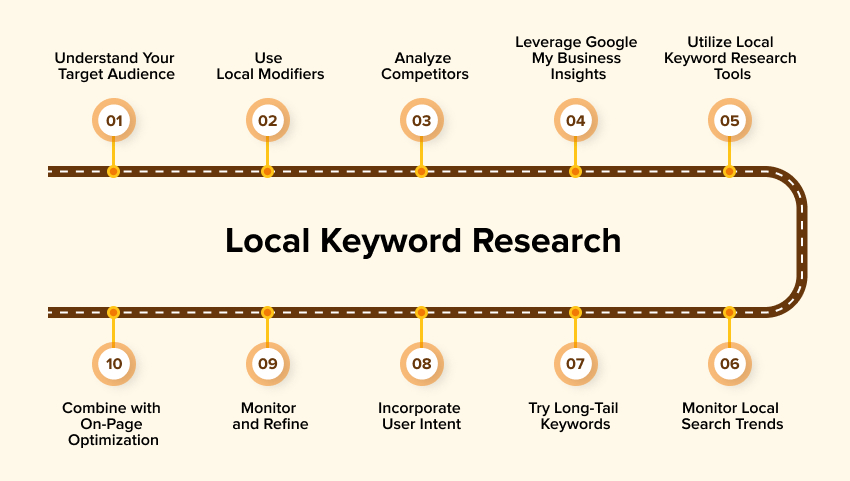
Local keyword research involves identifying and targeting keywords specific to a particular location or geographic area.
The figures in the images show how it is essential for businesses because it helps them optimize their online presence for local searches and attract customers in their target area.
Here are the top strategies for conducting local keyword research:
Understand Your Target Audience
Gain a deep understanding of your target audience, their preferences, and their language when searching for local products or services.
Use Local Modifiers
Your keyword research should include geo-modifiers. Also, you can reach customers in particular areas by using place names, neighborhoods, and regional phrases.
Consider the Competition
Check out what terms your regional rivals use on their websites and other online properties. Learn helpful information and locate untapped niches related to your keywords.
Use Data from Google’s My Business
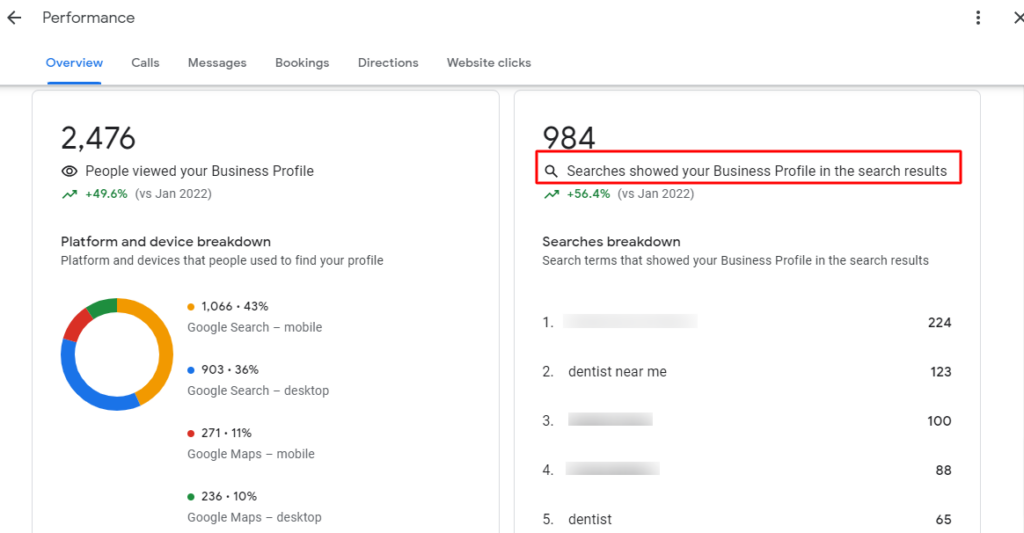
Use the data from your Google My Business page to learn more about the phrases people use to locate your company online. This information is helpful since it may inspire localized keyword usage.
Utilize Resources for Local Keyword Research
Make use of keyword research instruments that provide geo-targeted information. For instance, you may learn about search volume, competitiveness, and relevant local keywords using tools like Google Keyword Planner, SEMrush, or Moz.
Keep an Eye on the Latest Trends in Local searches
Know what’s happening in local search and how consumer behavior changes in your market. Adjusting your keyword approach like this is one way to remain ahead of the curve.
Use Long-Tail Keywords
Long-tail keywords are both particular and focused phrases, resulting in a lower search volume but better conversion potential when used in SEO. Use long-tail keywords with location modifiers to attract targeted visitors from your area.
Consider the Goals of the User
Learn the motivations behind people’s searches in your area. Are they in the research phase, ready to buy, or need specialized service? Then, modify your keyword choices to correspond with what locals seek.
Check and adjust
It is in your company’s best interest to keep a close eye on the results you’re getting from your selected local keywords and make any necessary revisions as you see fit. You can learn where you can make changes by monitoring your search engine rankings, organic traffic, and conversion rates.
Couple with Optimal Content Presentation
Titles, headers, meta tags, and content are places where you may carefully work in your chosen local keywords.

Local Content Creation
If we’re talking about local SEO, local content production is the strategy’s backbone since it allows marketers to interact more naturally with their target demographic.
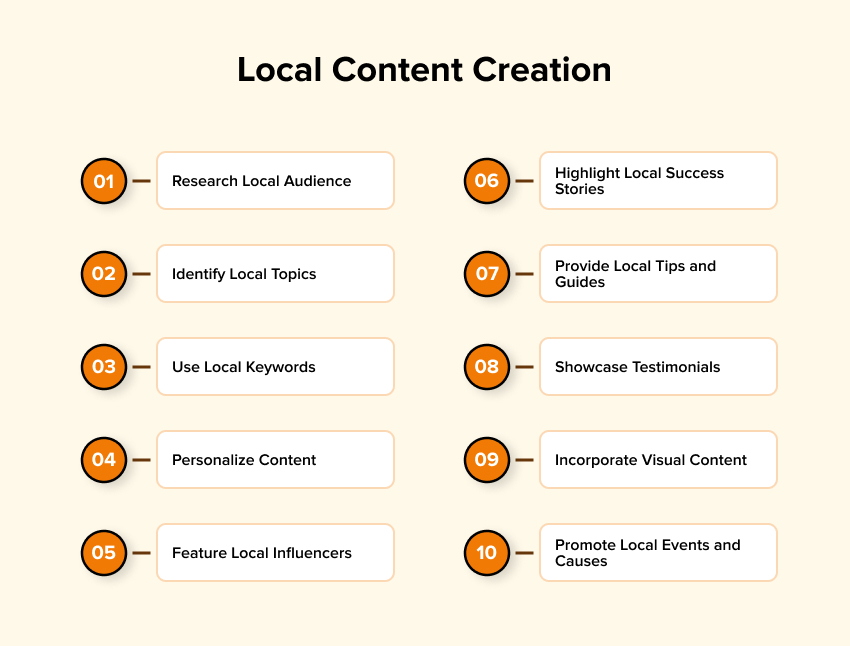
- Consider the Local Audience: Start by determining the audience’s preferences, interests, and suffering concerns. Also, you can concentrate on developing content that will appeal to them through this.
- Identify Local Topics: Always consider issues that matter to your area. For this, go through the local events, news, milestones, customs, and community issues.
- Showcase Regional Testimonials: Provide testimonials from satisfied local consumers to increase confidence and credibility.
- Localized the Keywords: Use relevant local keywords to improve your content’s visibility in local search results. Use words, landmarks, and local place names unique to your area.
- Adapt to the Locality for Content: Always ensure your material is suitable for the target audience in terms of language, values, and culture. Also, use tales, stories, and local connections to hook your listeners.
- Let the Local Influencer Take the Stage: Give the spotlight to the local hero. Connect with famous people in your neighborhood and see if you can work together.
- Give Advice and Directions for Your Area: You may develop material that includes “top local events” or “best places to visit” in your region by offering local guidance, tips, or suggestions.
- Appealing Visuals: You may attract more clients by including eye-catching graphic material on your site. We suggest including media that highlights regional scenery, activities, and people.
It’s time to enter the domain of techniques that will assist us with local content development and generate a more focused audience.
Monitor Website Analytics
Monitor website traffic, engagement metrics, and conversions from local content using technologies like Google Analytics.
Track Social Media Metrics
Keep track of social media activity, such as likes, shares, comments, and mentions of your local content.
Monitor Local Search Rankings
Keep track of your local keyword rankings and any improvements or adjustments in search engine results pages (SERPs).
Examine Lead and Conversion Information
You should track the number of leads or conversions your local content initiatives create. This allows you to understand the efficacy of your content in driving desired behaviors.
Collect Feedback and Reviews
Encourage consumers to write reviews or comments on your local content. This feedback might provide helpful information about how your material is viewed and accepted.
Use heatmaps and user behavior analysis tools
Understand how visitors engage with your local content by using tools such as heatmaps or user behavior analytics. Then, completely comprehend it and suggest areas for improvement or optimization.
Remember that local content’s success is more than statistics; it’s about developing connections, engaging the local community, and establishing your brand as a recognized local authority.
Read:- Improve Website Visibility with Technical SEO: Ultimate Guide
Online Reviews Management
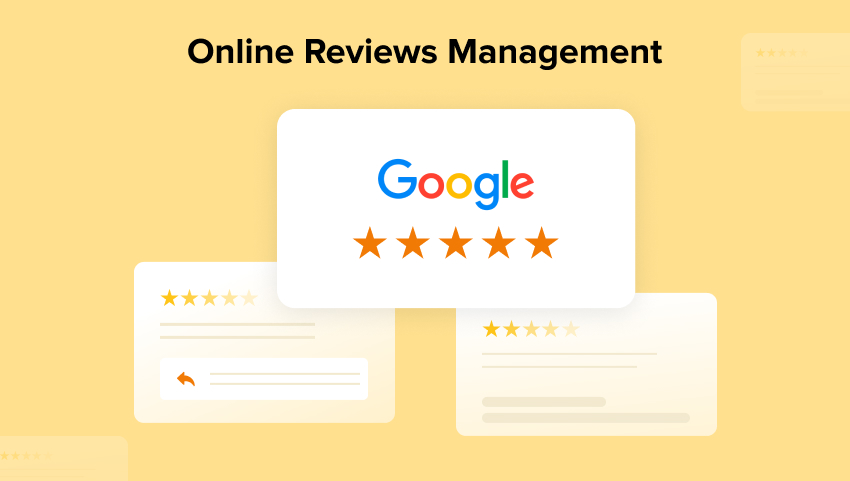
Management of online reviews is regularly monitoring, reacting to, and exploiting consumer evaluations and comments about your company on multiple online platforms. It is essential because online reviews significantly impact your reputation, credibility, and local SEO. Positive reviews can attract more customers, while negative reviews can harm your reputation and potential business opportunities.
Let’s explore the tactics for online review management.
Monitor Review Platforms: Regularly check popular review platforms such as Google My Business, Yelp, TripAdvisor, or industry-specific sites for new reviews about your business.
Encourage Reviews: Proactively ask satisfied customers to leave reviews about their experience. Customers appreciate efforts, so make it convenient by rendering them links or instructions on where and how to leave a review.
Address Reviews: Show compassion, face your faults, and provide alternatives when reacting to criticism. Show that you care about your customers by giving them what they want. In addition, promote the reviews that are good on your website, social media, and any other marketing platforms you use. This will help you build trust with current and future clients.
Learn from Feedback: Review your goods, services, and customer service to see where you may make changes to serve your customers better. The next step is to adapt your strategy to account for what you’ve learned.
Monitoring online reviews can be more convenient than ever with these efficient tools:
- Google Alerts: Create Google Alerts for your company name and related keywords to stay abreast of any online reviews as soon as they appear.
- ReviewTrackers: It is an all-inclusive review tracking application with built-in analytics and reporting capabilities.
- Yext: It will facilitate streamlined review management by enabling users to monitor and reply to reviews from a centralized dashboard.
- Mention: It monitors where your brand name is being mentioned online. This might be on everything from review sites to social media, blogs, and news sites.
By effectively managing online reviews, businesses can build a positive reputation, attract more customers, and enhance their local SEO efforts.
Local Link Building
Link building is vital for local SEO as it helps improve your website’s authority, visibility, and ranking in local search results. Moreover, quality local links nudge Google that your business is pertinent and reliable for your local.
Well, as we proceed with the link building, let us introduce some of the most effective strategies for building local links:
Get Listed in Local Directories: It is best to submit your business to reputable local directories, industry-specific directories, and local chamber of commerce websites.
Partner with Local Organizations: Collaborate with local charities, schools, or community organizations and seek co-marketing sponsorships or guest blogging opportunities.
Build Relationships with Local Influencers: Contact local bloggers, influencers, and journalists who cover themes relevant to your sector or location. Provide good material or collaborate on projects that might lead to local link chances.
Create Local Resource Guides or Content: Develop high-quality content such as local resource guides, city-specific tips, or local event calendars. This type of content can attract local links from other websites.
Engage in Local Sponsorships or Events: Contribute to local events, sponsorships, and community activities. These connections often result in local companies or organizations connecting to your website.
Look for Local Media Coverage: Send exciting articles or press releases about your company to local media sources, newspapers, or internet publications. Also, increase your local exposure by generating local backlinks.
Blog as a Guest on Local Websites: Offer to create guest blog entries for local websites or magazines on business-related issues. This may bring visibility as well as applicable local backlinks.
Encourage Customers to Link to Your Website
Include a call-to-action on your website; encouraging happy clients to link back to your material is beneficial and beneficial.
We have compiled a list of tools you may utilize to achieve your goal.
- Google Search Console: Backlinks leading to your website are monitored and reported, allowing you to follow your link-building efforts over time.
- Link Explorer by Moz: Aids in the analysis of your website’s link profile, the tracking of new links, and the identification of link-building prospects.
- Ahrefs: Provides detailed backlink research, assists in tracking your link-building progress, and suggests possible link-building chances.
- SEMrush: Provides backlink analysis, competition information, and link-building suggestions to help you increase your website’s authority.
Now, businesses have the chance to improve their local SEO efforts, expand their online exposure, and attract more local clients by using these successful local link-building tactics and leveraging the correct tools.
Wrap Up
Managing online reviews and constructing local links are critical to enhancing your local SEO efforts. Online reviews have a significant effect on your reputation and consumer choices. At the same time, local link development can assist in increasing the authority and visibility of your website in local search results. Also, these companies develop a solid online presence, attract local clients, and drive growth in their chosen region by applying the techniques indicated and employing the recommended technologies.
FAQs
Local SEO is the process of optimizing a website in order to attract clients in a particular geographic location. It is critical for small companies since it increases their internet presence and helps them acquire local clients.
The following are essential components of a good local SEO strategy:
– Adding relevant keywords to the webpage.
– Taking control of and enhancing your Google My Business listing.
– Receiving great feedback from customers.
– Ensure that business information is consistent and accurate throughout online directories.
Small companies may enhance their local search results by optimizing their website for local keywords, generating high-quality and relevant content, establishing local citations, obtaining good customer reviews, and actively interacting with their local community.
Some frequent local SEO errors to avoid include failing to claim and improve your Google My Business page, utilizing inconsistent company information across several directories, disregarding customer reviews, and failing to target local keywords effectively.
Social media helps local SEO by connecting with the local audience, sharing local news and events, encouraging consumer reviews and comments, and boosting local content. Thus, it helps increase brand exposure and attract more company website visitors.








